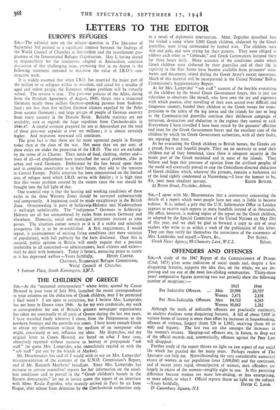LETTERS TO THE EDITOR
EUROPE'S REFUGEES
SIR,—The editorial note on the refugee .question in The Spectator of September 3rd pointed to a significant contrast between the findings of the World Council of Churches at Amsterdam and the resettlement pro- gramme of the International Refugee Organisation. May I, having shared in responsibility for the resolutions adopted at Amsterdam, continue discussion of this challenging issue, premising that in no degree is the following statement intended to minimise the value of I.R.O.'s con- structive work.
It is widely assumed that when I.R.O. has resettled the major part of the million or so refugees within its mandate, and cared for a residue of aged and infirm people, the European refugee problem will be virtually solved. The reverse is true. The post-war policies of the Allies, dating from the Potsdam Agreement of August, 1945, thrust into a truncated Germany nearly three million German-speaking persons from Sudeten- land ; not less than five million German' citizens expelled by the Poles from eastern Germany ; and large groups of people of German ancestry from every country in the Danube Basin. Reliable statistics are not available, save as regards the huge expulsion from Czechoslovakia in 1946-47. A careful estimate prepared for use at Amsterdam put the total of these post-war expulses at over ten millions ; it is almost certainly higher. And migration westward still continues.
The grim fact is that there are far more uprooted people in Europe today than at the close of the war. Not more than ten per cent. of these exiles are under the protection of the I.R.O. The rest are excluded by the terms of its Charter. Their needs of food, clothing, shelter and— most of all—of employment have intensified the social problem, alike in urban and rural Germany. Embittered by the fate forced upon them and in complete uncertainty as to their future, they add to the tensions in Central Europe. Public attention has been concentrated on the limited area of refugee need which I.R.O. serves with fidelity ; it is high time that this vaster problem created by the victors since the war should be brought into the full light of day.
One essential step is that the housing and working conditions of these
exiles in the three Western Zones should be surveyed authoritatively and competently. A beginning could be made straightaway in the British Zone. Overcrowding in parts of Schleswig-Holstein and Niedersachsen is well-nigh unbelievable. The "indigenous" Germans in Schleswig- Holstein are all but outnumbered by exiles from eastern Germany and elsewhere. Domestic, social and municipal irritations increase as time passes. The situation cannot remain as it is if a stable and relatively prosperous life is to be re-established. A first requirement, I would repeat, is ascertainment of existing living conditions (not mere statistics of population), with full publicity for the facts disclosed. Once this is secured, public opinion in Britain will surely require that a position intolerable to all concerned—to administrators, local citizens and exiles— shall be dealt with humanely. Today it festers, menacing peace as surely as it has depressed welfare.—Yours faithfully, HENRY CARTER.
Chairman, Ecumenical Refugee Commission, World Council of Churches.
5 Sumner Place, South Kensington, Si)V.7.


































 Previous page
Previous page